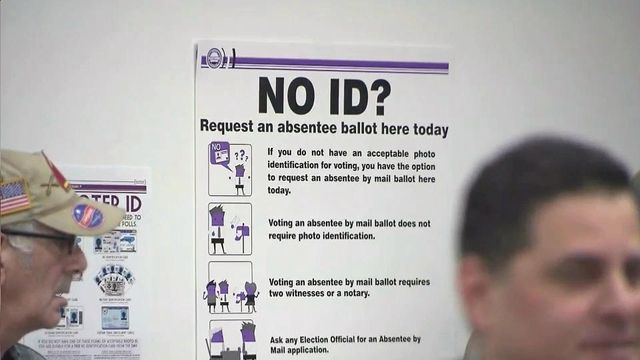Amendment would put voter ID in NC constitution
Voters wouldn't see more detailed language, including what IDs can be used, before voting on the proposed amendment in November.
Posted — UpdatedThe bill would ask voters to decide this November whether to add this paragraph to the constitution: "Photo identification for voting in person. Every person offering to vote in person shall present photo identification before voting in the manner prescribed by law."
The requirement deals only with in-person voting, not absentee voting.
Voters wouldn't necessarily see more details, including what sorts of ID would qualify, before voting. That would be laid out later by the General Assembly in a separate bill. Moore, R-Cleveland, said North Carolinians can look to other states with voter ID is already in place examples of what the legislature would approve.
The measure will start in the House, but the language has been discussed by House and Senate leadership, Senate President Pro Tem Phil Berger said. Legislators hope to wrap this session by the end of the month, which would put the proposal on the House and Senate floors for votes within the next few weeks.
It must pass both chambers with support from three-fifths of the membership to go on the ballot. The measure wouldn't be subject to the governor's veto.
Republicans have championed photo IDs as the best defense against voter fraud, but Meredith College political science professor David McLennan said instances of in-person voter fraud are "very minimal."
"It is not a widespread issue, despite what politicians say," McLennan said.
An audit by the State Board of Elections & Ethics Enforcement following the 2016 general election found only one case of voter fraud that an ID might have prevented – out of 4.8 million ballots cast. In that case, a woman voted in her mother's name after her mother passed away, and she wasn't charged with a crime.
"This is a lot of effort to reduce that kind of voter fraud by one," McLennan said.
The General Assembly's last push for voter ID was struck down by the federal courts, which found racial discrimination in that effort and in a number of other changes to voting laws included in a 2013 bill. That bill was rolled out a day after the U.S. Supreme Court struck down a portion of the U.S. Voting Rights Act requiring pre-clearance of voting law changes by the federal government.
The 4th U.S. Circuit Court of Appeals decided in 2016 that the Republican majority targeted black voters "with almost surgical precision" in that law, noting among other things that the legislature had data in hand showing African-Americans were less likely than white voters to have the sort of identification required.
A previous version of that 2013 bill, proposed before the court changed the Voting Rights Act, would have allowed other government IDs, including expired ones.
Allison Riggs, an attorney with the Southern Coalition for Social Justice who argued against the 2013 law in the lengthy court reviews that followed, said in a statement Thursday that legislators are "trying to trick voters into doing their dirty work for them."
"This is an obvious effort to implement a policy that has been shot down as being racially discriminatory," Riggs, who has also been a lead attorney on lawsuits to throw out election maps drawn by this legislature, said in her statement.
“Just as when the legislature tried this in 2011 and 2013, we know that thousands of eligible North Carolina voters lack photo identification," she said. "These voters are disproportionately voters of color, elderly voters, women and voters with physical challenges."
McLennan said the amendment referendum is squarely aimed at juicing Republican turnout in the midterm elections, when many national political observers have been forecasting a "blue wave" of Democratic opposition to President Donald Trump.
"They may not be crazy about some of their candidates, but when they see something like voter ID or any number of other things that could be constitutional issues, that could get people out," he said.
"Whether the truth is or the facts are there supporting voter fraud or not, it tends to be those kind of issues that drive that Trump base out," he added. "This is a whole turnout election. So, whether it's Democrats who are anti-Trump or are running on a platform or Republicans who are running on red meat issues like voter ID, it's all looking ahead to November."
Even if voters do amend the state constitution with this language, there's still a good chance the issue ends up back in federal court. State constitutional arguments against the last voter ID law were ancillary, and the law was struck down under federal law. But a state constitutional amendment would remove a legal argument against photo ID.
It would also bolster the political argument for Republicans who have repeatedly pointed to polls showing voter ID to be popular in North Carolina.
"I like the fact that, at the end of the day, it's the voters who decide," Moore said.
The concept of voter ID has been upheld by the courts, and more than 30 states now require some form of it.
McLennan said the devil is in the details of how North Carolina lawmakers decide to implement it.
"Whatever bill is passed giving the details to what voter ID means and how it's used, that could lead to more court cases," he said.
Related Topics
• Credits
Copyright 2024 by Capitol Broadcasting Company. All rights reserved. This material may not be published, broadcast, rewritten or redistributed.






